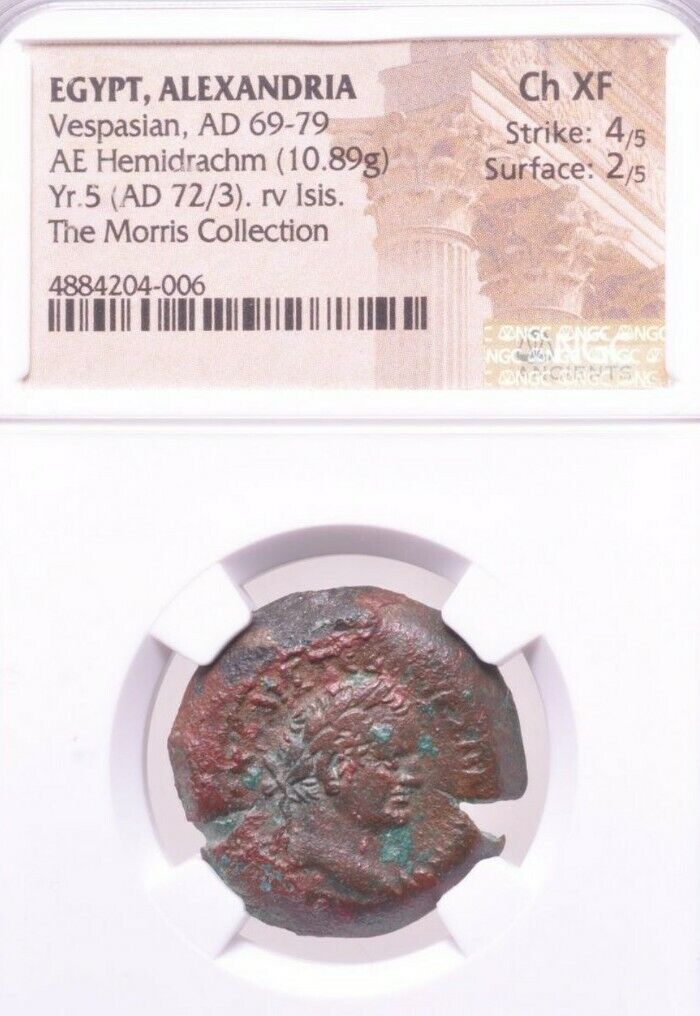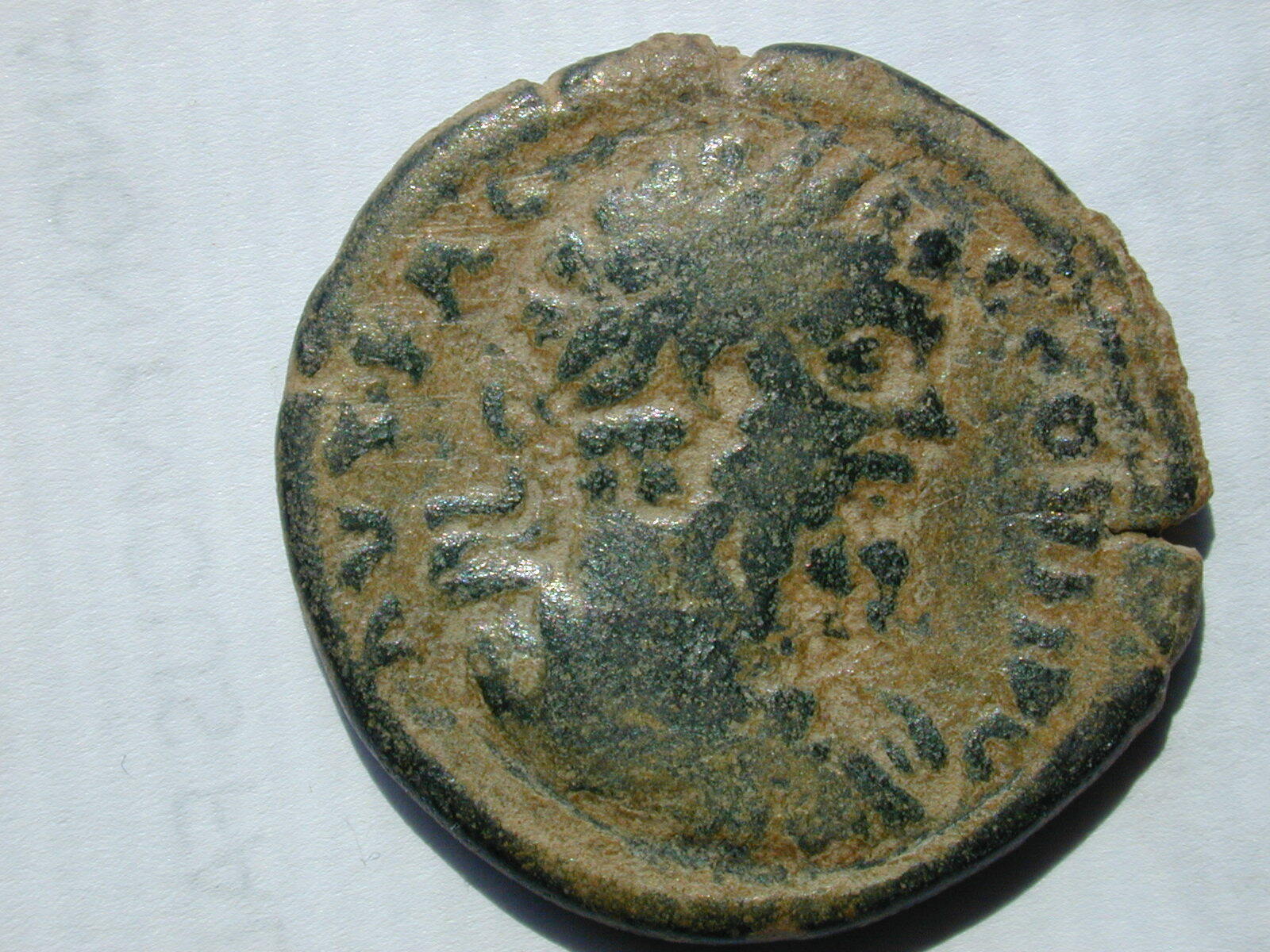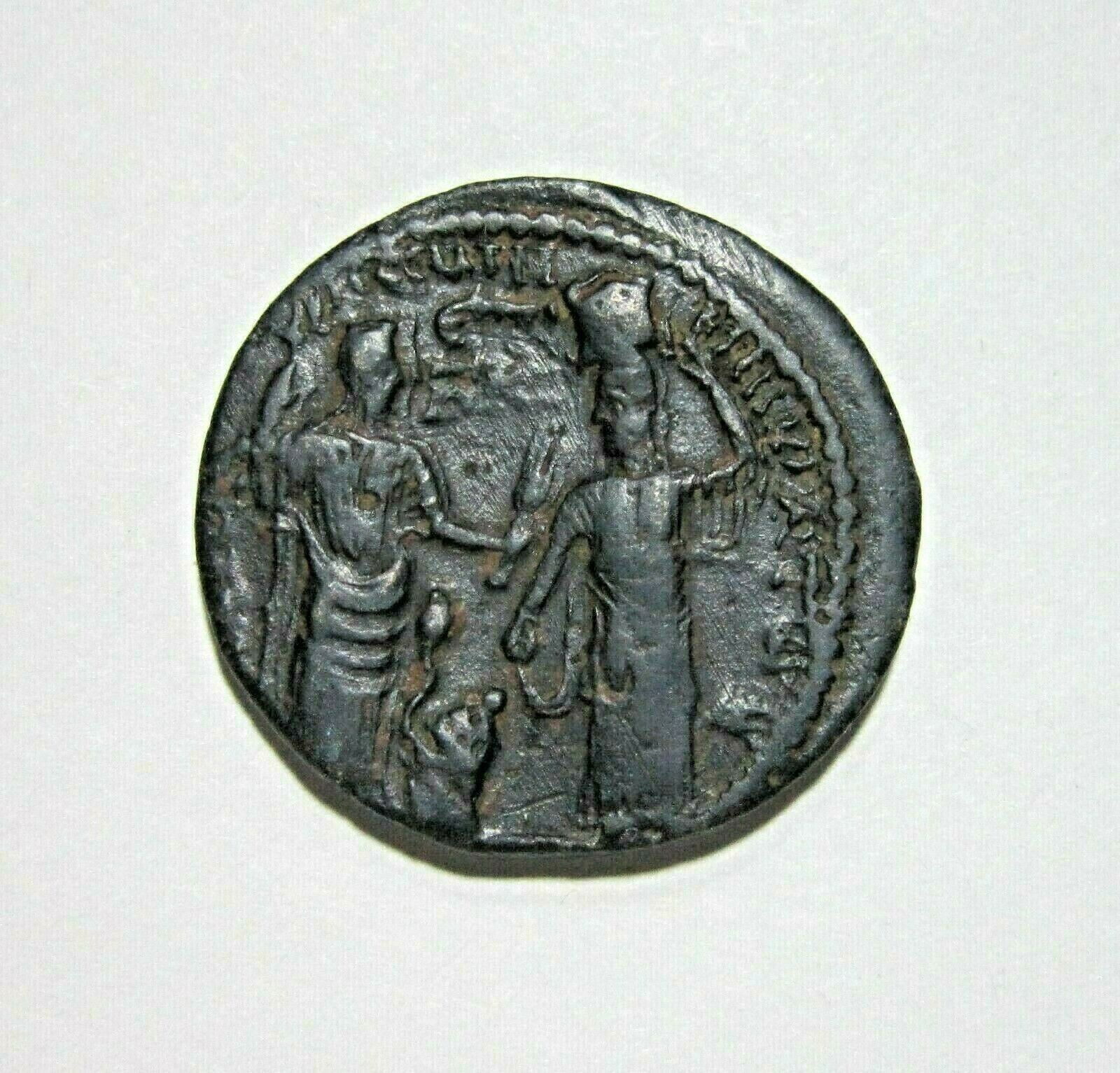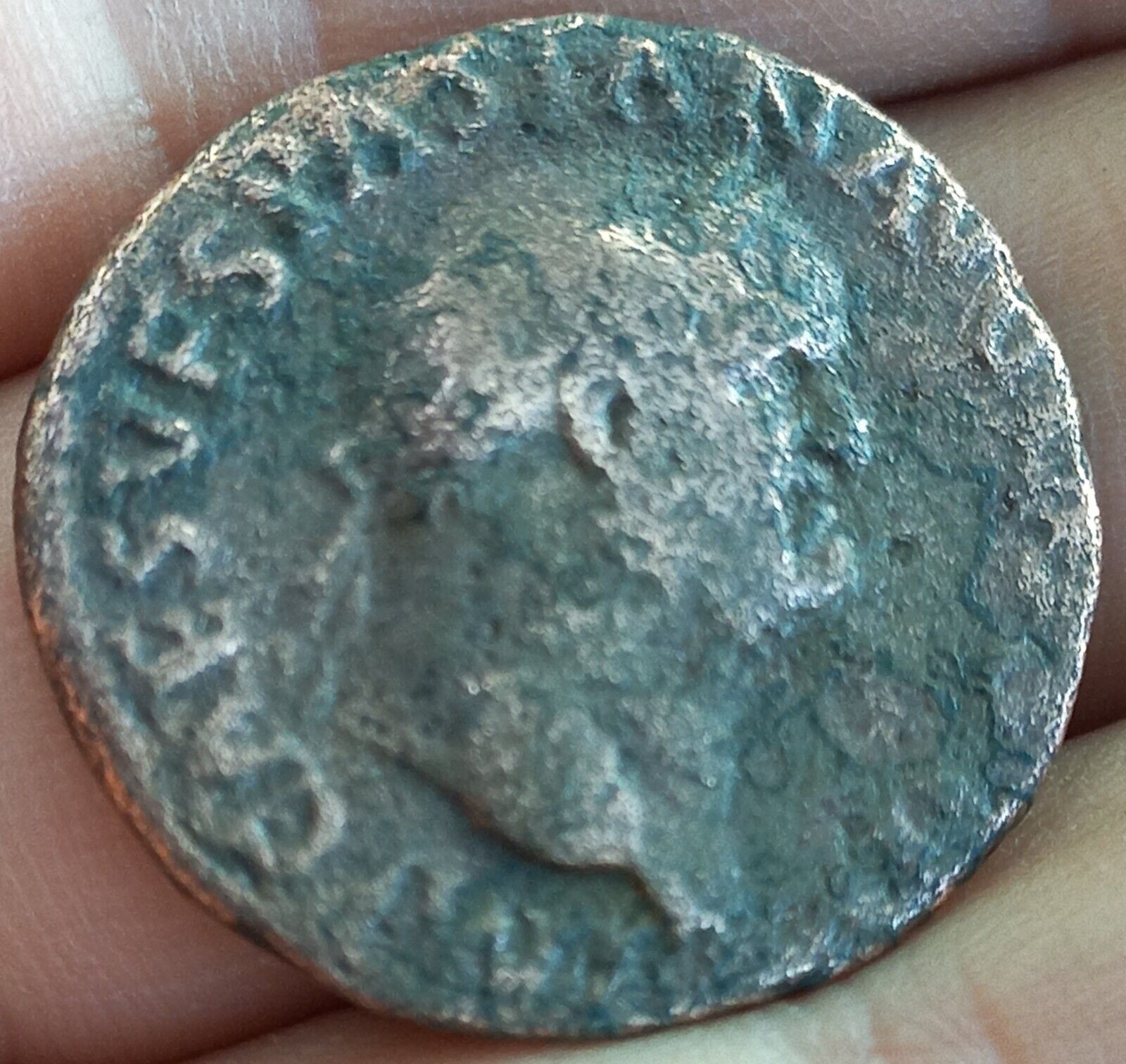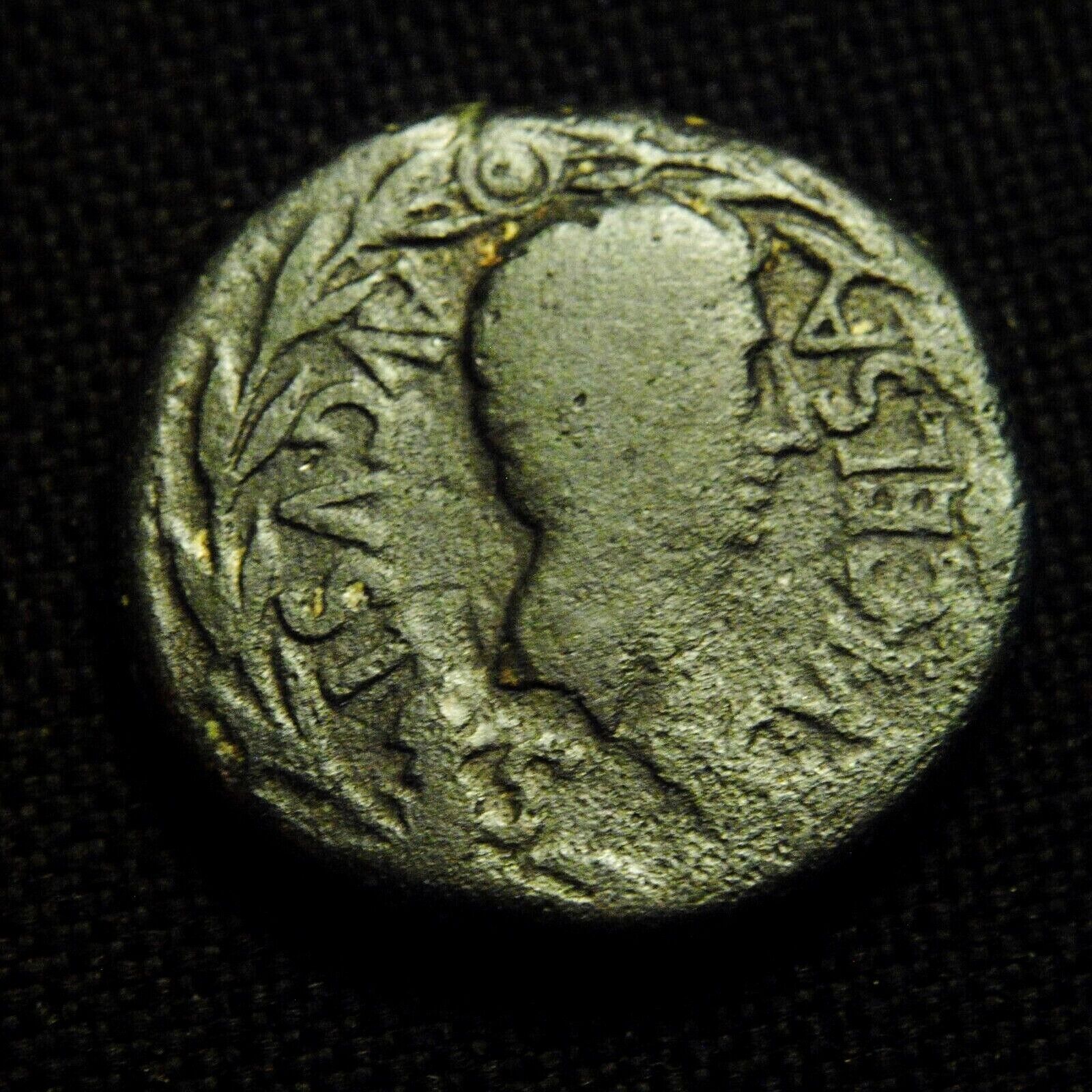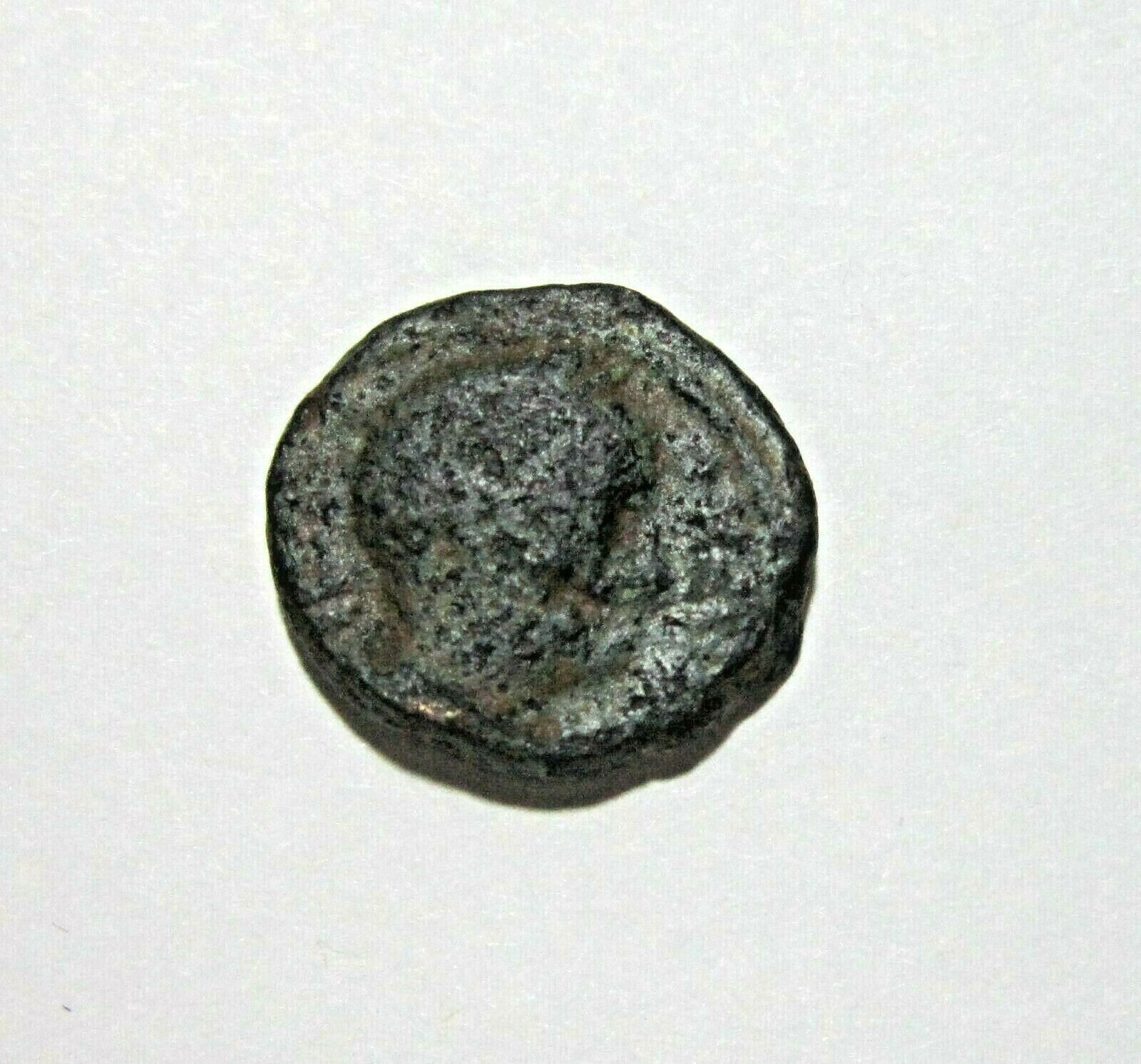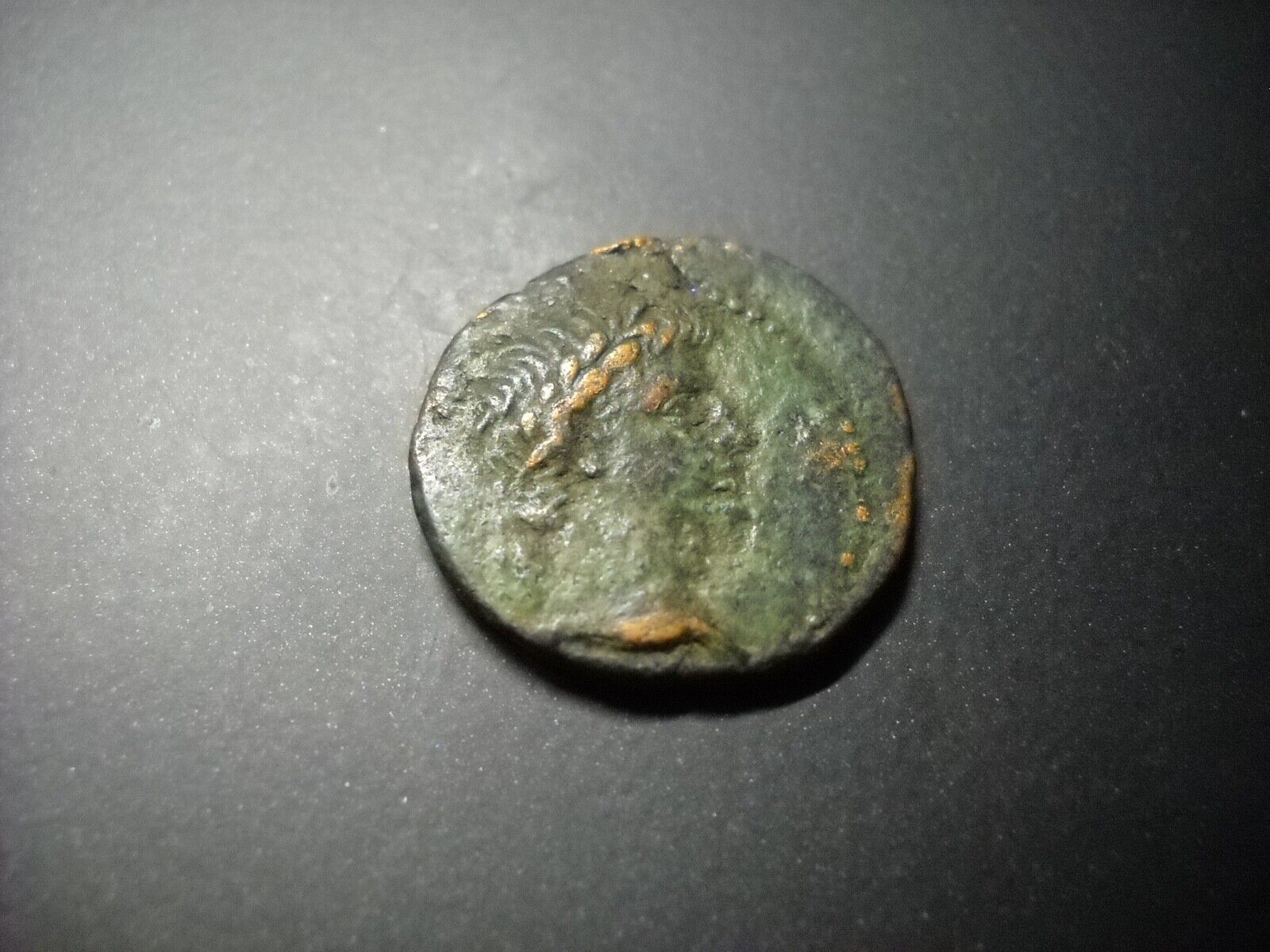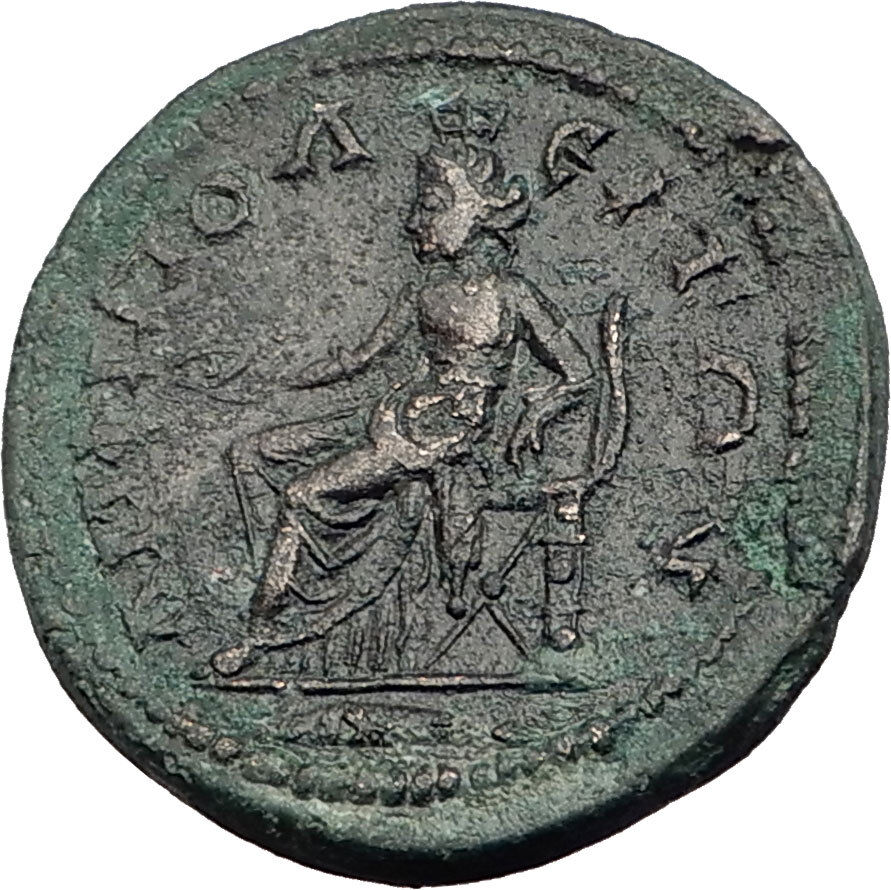-40%
ANTONINUS PIUS Philippopolis Thrace Ancient Roman Coin Bacchus Dionysus i48515
$ 26.4
- Description
- Size Guide
Description
Item:i48515
Authentic Ancient Coin of:
Antoninus Pius
-
Roman Emperor
: 138-161 A.D.
Bronze 19mm (4.20 grams) of
Philippopolis
in
Thrace
Bare head right.
ΦΙΛΙΠΠΟΠΟΛEΙΤ, Dionysus standing left, holding thyrsos and kantharos.
You are bidding on the exact item pictured, provided with a Certificate of Authenticity and Lifetime Guarantee of Authenticity.
Red-figure
kantharos,
National Archaeological Museum of Athens
.
A
kantharos
(Greek κάνθαρος) or
cantharus
is a type of
Greek pottery
used for drinking. It is characterized by its high swung handles which extend above the lip of the pot.
The god
Dionysus
had a kantharos which was never empty.
Geometric
kantharos
In
Greek mythology
, a
thyrsus
or
thyrsos
(
Greek
:
θύρσος
) was a staff of
giant fennel
(
Ferula communis
) covered with
ivy
vines and leaves, sometimes wound with
taeniae
and always topped with a
pine
cone
. These staffs were carried by
Dionysus
and his followers.
Euripides
wrote that
honey
dripped from the thyrsos staves that the
Bacchic
maenads
carried.The thyrsus was a sacred instrument at religious rituals and
fêtes
.\
Symbolism
The thyrsus, associated with
Dionysus
(or Bacchus) and his followers, the
Satyrs
and
Maenads
, is a symbol of
prosperity
,
fertility
,
hedonism
, and pleasure/enjoyment in general. It has been suggested that this was specifically a fertility
phallus
, with the fennel representing the shaft of the penis and the pine cone representing the "seed" issuing forth. The thyrsus was tossed in the Bacchic dance:
Pentheus
: The thyrsus— in my right hand shall I hold it?
Or thus am I more like a Bacchanal?
Dionysus
: In thy right hand, and with thy right foot raise it"
Sometimes the thyrsus was displayed in conjunction with a
kantharos
wine cup, another symbol of Dionysus, forming a male-and-female combination like that of the royal scepter and orb.
Literature
In the
Iliad
,
Diomedes
, one of the leading warriors of the
Achaeans
, mentions the thyrsus while speaking to
Glaucus
, one of the
Lycian
commanders in the
Trojan
army, about
Lycurgus
, the king of
Scyros
:
He it was that/drove the nursing women who were in charge/of frenzied Bacchus through the land of Nysa,/and they flung their thyrsi on the ground as/murderous Lycurgus beat them with his ox-/goad. (
Iliad
, Book VI.132-37)
The thyrsus is explicitly attributed to Dionysus in
Euripides
's play
The Bacchae
as part of the costume of the Dionysian cult.
...To raise my Bacchic shout, and clothe all who respond/ In fawnskin habits, and put my thyrsus in their hands–/ The weapon wreathed with ivy-shoots..." Euripides also writes, "There's a brute wildness in the fennel-wands—Reverence it well." (
The Bacchae and Other Plays
, trans. by Philip Vellacott, Penguin, 1954.)
Socrates
writes in
Phaedo
:
I conceive that the founders of the mysteries had a real meaning and were not mere triflers when they intimated in a figure long ago that he who passes unsanctified and uninitiated into the world below will live in a slough, but that he who arrives there after initiation and purification will dwell with the gods. For "many," as they say in the mysteries, "are the thyrsus bearers, but few are the mystics,"--meaning, as I interpret the words, the true philosophers.
In Part II of
Johann Wolfgang von Goethe
's
Faust
,
Mephistopheles
tries to catch a
Lamia
, only to find out that she is an illusion:
Well, then, a tall one I will catch.../And now a thyrsus-pole I snatch!/Only a pine-cone as its head. (7775-7777)
Sookie Stackhouse notes the thyrsus carried by the maenad in the 2nd book of
The Southern Vampire Mysteries
.
She idly waved the long wand with the tuft on the end. It was called a thyrsis [
sic
]; I’d looked maenad up in the encyclopedia. Now I could die educated. (Harris, Charlaine (2006-09-01). "Living Dead in Dallas: A Sookie Stackhouse Novel"}
Gallery
A Bacchant holding a thyrsus:
Malice
, by
William-Adolphe Bouguereau
, 1899
Roman relief showing a Maenad holding a thyrsus (
Prado
,
Madrid
).
Bacchus Triumphant
(1882)
by
John Reinhard Weguelin
A Maenad uses her thrysos to ward off a Satyr,
Attic red-figure
kylix
, circa 480 BC
Dionysus
is the god of the grape harvest, winemaking and wine, of ritual madness, fertility, theatre and religious ecstasy in
Greek mythology
. Alcohol, especially
wine
, played an important role in Greek
culture with Dionysus being an important reason for this life style. His name, thought to be a
theonym
in
Linear B
tablets as
di-wo-nu-so
(
KH
Gq 5 inscription), shows that he may have been worshipped as early as c. 1500–1100 BC by
Mycenean Greeks
; other traces of the Dionysian-type cult have been found in ancient
Minoan Crete
. His origins are uncertain, and his cults took many forms; some are described by ancient sources as Thracian, others as Greek. In some cults, he arrives from the east, as an Asiatic foreigner; in others, from
Ethiopia
in the South. He is a god of
epiphany
, "the god that comes", and his "foreignness" as an arriving outsider-god may be inherent and essential to his cults. He is a major, popular figure of
Greek mythology
and
religion
, and is included in some lists of the
twelve Olympians
. Dionysus was the last god to be accepted into Mt. Olympus. He was the youngest and the only one to have a mortal mother. His festivals were the driving force behind the development of
Greek theatre
. He is an example of a
dying god
.
The earliest cult images of Dionysus show a mature male, bearded and robed. He holds a
fennel
staff, tipped with a pine-cone and known as a
thyrsus
. Later images show him as a beardless, sensuous, naked or half-naked androgynous youth: the literature describes him as womanly or "man-womanish". In its fully developed form, his central cult imagery shows his triumphant, disorderly arrival or return, as if from some place beyond the borders of the known and civilized. His procession
(
thiasus
)
is made up of wild female followers (
maenads
) and bearded
satyrs
with
erect penises
. Some are armed with the
thyrsus
, some dance or play music. The god himself is drawn in a chariot, usually by exotic beasts such as lions or tigers, and is sometimes attended by a bearded, drunken
Silenus
. This procession is presumed to be the cult model for the human followers of his
Dionysian Mysteries
. In his
Thracian
mysteries, he wears the
bassaris
or
fox
-skin, symbolizing a new life. Dionysus is represented by city religions as the protector of those who do not belong to conventional society and thus symbolizes everything which is chaotic, dangerous and unexpected, everything which escapes human reason and which can only be attributed to the unforeseeable action of the gods.
Also known as
Bacchus
, the name adopted by the
Romans
and the frenzy he induces,
bakkheia
. His
thyrsus
is sometimes wound with ivy and dripping with honey. It is a beneficent wand but also a weapon, and can be used to destroy those who oppose his cult and the freedoms he represents. He is also called
Eleutherios
("the liberator"), whose wine, music and ecstatic dance frees his followers from self-conscious fear and care, and subverts the oppressive restraints of the powerful. Those who partake of his mysteries are possessed and empowered by the god himself. His cult is also a "cult of the souls"; his maenads feed the dead through blood-offerings, and he acts as a divine communicant between the living and the dead.
In Greek mythology, he is presented as a son of
Zeus
and the mortal
Semele
, thus semi-divine or
heroic
: and as son of Zeus and
Persephone
or
Demeter
, thus both fully divine, part-
chthonic
and possibly identical with
Iacchus
of the
Eleusinian Mysteries
. Some scholars believe that Dionysus is a
syncretism
of a local Greek nature deity and a more powerful god from
Thrace
or
Phrygia
such as
Sabazios
or
Zalmoxis
.
Plovdiv
(
Bulgarian
:
Пловдив
) is
the second-largest city
in
Bulgaria
with a population of 380,683. Plovdiv's history spans some 6,000 years, with traces of a Neolithic settlement dating to roughly 4000 BC. It is the administrative center of
Plovdiv Province
in southern Bulgaria and three municipalities (Plovdiv,
Maritsa
and
Rodopi
) and Bulgaria's
Yuzhen tsentralen
planning region (NUTS II), as well as the largest and most important city in
Northern Thrace
and the wider international historical region of
Thrace
. The city is an important economic, transport, cultural and educational center.
Known in the West for most of its history by the
Greek
name
Philippopolis
, it was originally a
Thracian
settlement before becoming a major
Roman
city. In the Middle Ages, it retained its strategic regional importance, changing hands between the
Byzantine
and
Bulgarian Empires
. It came under
Ottoman
rule in the 14th century. In 1878, Plovdiv was made the capital of the autonomous Ottoman region of
Eastern Rumelia
; in 1885, it became part of Bulgaria with the
unification
of that region and the
Principality of Bulgaria
.
Plovdiv is situated in the southern part of the Plovdiv Plain on the two banks of the
Maritsa River
. The city has historically developed on seven
syenite
hills, some of which are 250 m high. Because of these seven hills, Plovdiv is often referred to in Bulgaria as "The City of the Seven Hills".
There are many remains preserved from
Antiquity
such as the
Ancient amphitheatre
, Roman odeon,
Roman Stadium
, the archaeological complex
Eirene
and others.
Plovdiv was given various names throughout its long history. It was originally a
Thracian
settlement by the name of
Eumolpias
.
Philip II of Macedon
conquered the area in 342-341 BC and renamed the city
Philippoupolis
(
Greek
:
Φιλιππούπολις
), of which the later Thracian name for the city,
Pulpu-deva
, is a reconstructed translation. After the Romans took control of the area, the city was named
Latin
:
Trimontium
, meaning the Three Hills. During the Middle Ages the city was known as Philippoupolis in
Byzantine Greek
and
Paldin
(Пълдин) or
Plavdiv
(Плъвдив) in
Old Bulgarian
, variations of the town's earlier
Thracian
name. The city was known as Philippopolis in Western Europe well into the early 20th century. The city was known as
Filibe
in
Turkish
during the
Ottoman Empire
.
Plovdiv has settlement traces dating from the Neolithic, roughly 4000 BC. Archaeologists have discovered fine pottery and other objects of everyday life from as early as the Neolithic Age, showing that in the end of the 4
th
millennium B.C. there already was an established settlement there. According to
Ammianus Marcellinus
, Plovdiv's written post-Bronze Age history lists it as a
Thracian
fortified settlement named Eumolpias. In 4th century BC the city was a centre of a trade fair (called
panegyreis
). In 342 BC, it was conquered by
Philip II of Macedon
, the father of
Alexander the Great
, who renamed it "Φιλιππόπολις",
Philippopolis
or "the city of Philip" in his own honour. Later, it was reconquered by the
Thracians
who called it
Pulpudeva
(a reconstructed translation of Philipopolis)
In 72 AD it was seized by the Roman general Terentius Varo Lukulus and was incorporated into the
Roman Empire
, where it was called
Trimontium
(
City of Three Hills
) and served as metropolis (capital) of the province of
Thrace
. It gained a city status in late 1st century. Trimontium was an important crossroad for the Roman Empire and was called "The largest and most beautiful of all cities" by
Lucian
. Although it was not the capital of the Province of Thrace, the city was the largest and most important centre in the province. In those times, the
Via Militaris
(or
Via Diagonalis
), the most important military road in the
Balkans
, passed through the city.
"This [Plovdiv] is the biggest and loveliest of all cities. Its beauty shines from faraway..."
Roman writer
Lucian
.
The Roman times were a period of growth and cultural excellence. The ancient ruins tell a story of a vibrant, growing city with numerous public buildings, shrines, baths, and theatres. The city had an advanced water system and
sewerage
. It was defended with a double wall. Many of those are still preserved and can be seen by tourists. Today only a small part of the ancient city has been excavated.
Titus Aurelius Fulvus Boionius Arrius Antoninus
(19 September 86 – 7 March 161), generally known in English as
Antoninus Pius
was
Roman emperor
from 138 to 161. He was the fourth of the
Five Good Emperors
Antoninus Pius
, Marcus Aurelius' adoptive father and predecessor as emperor (Glyptothek).
and a member of the
Aurelii
. He did not possess the
sobriquet
"
Pius
" until after his accession to the throne. Almost certainly, he earned the name "Pius" because he compelled the
Senate
to deify his adoptive father
Hadrian
; the
Historia Augusta
, however, suggests that he may have earned the name by saving senators sentenced to death by Hadrian in his later years.
//
He was the son and only child of
Titus Aurelius Fulvus
,
consul
in 89 whose family came from
Nemausus
(modern
Nîmes
) and was born near
Lanuvium
and his mother was Arria Fadilla. Antoninus’ father and paternal grandfather died when he was young and he was raised by
Gnaeus Arrius Antoninus
, his maternal grandfather, a man of integrity and culture and a friend of
Pliny the Younger
. His mother married to Publius Julius Lupus (a man of consular rank),
Suffect Consul
in 98, and bore him a daughter called Julia Fadilla.
As a private citizen between 110 and 115, he married Annia Galeria
Faustina the Elder
. They had a very happy marriage. She was the daughter of consul
Marcus Annius Verus
and
Rupilia
Faustina (a half-sister to Roman Empress
Vibia Sabina
). Faustina was a beautiful woman, renowned for her wisdom. She spent her whole life caring for the poor and assisting the most disadvantaged Romans.
Having filled with more than usual success the offices of
quaestor
and
praetor
, he obtained the consulship in 120; he was next appointed by the Emperor
Hadrian
as one of the four
proconsuls
to administer
Italia
, then greatly increased his reputation by his conduct as
proconsul
of
Asia
. He acquired much favor with the Emperor Hadrian, who adopted him as his son and successor on 25 February, 138, after the death of his first adopted son
Lucius Aelius
, on the condition that Antoninus would in turn adopt Marcus Annius Verus, the son of his wife's brother, and Lucius, son of Aelius Verus, who afterwards became the emperors
Marcus Aurelius
and
Lucius Verus
(colleague of Marcus Aurelius).
Emperor
On his accession, Antoninus' name became "Imperator Caesar Titus Aelius Hadrianus Antoninus Augustus Pontifex Maximus". One of his first acts as Emperor was to persuade the
Senate
to grant divine honours to Hadrian, which they had at first refused; his efforts to persuade the Senate to grant these honours is the most likely reason given for his title of
Pius
(dutiful in affection; compare
pietas
). Two other reasons for this title are that he would support his aged father-in-law with his hand at Senate meetings, and that he had saved those men that Hadrian, during his period of ill-health, had condemned to death. He built temples, theaters, and mausoleums, promoted the arts and sciences, and bestowed honours and financial rewards upon the teachers of
rhetoric
and
philosophy
.
In marked contrast to his predecessors
Trajan
and
Hadrian
, Antoninus was not a military man. One modern scholar has written "It is almost certain not only that at no time in his life did he ever see, let alone command, a Roman army, but that, throughout the twenty-three years of his reign, he never went within five hundred miles of a legion".
[2]
His reign was the most peaceful in the entire history of the
Principate
; while there were several military disturbances throughout the Empire in his time, in
Mauretania
,
Iudaea
, and amongst the
Brigantes
in
Britannia
, none of them are considered serious. The unrest in Britannia is believed to have led to the construction of the
Antonine Wall
from the
Firth of Forth
to the
Firth of Clyde
, although it was soon abandoned. He was virtually unique among emperors in that he dealt with these crises without leaving Italy once during his reign, but instead dealt with provincial matters of war and peace through their governors or through imperial letters to the cities such as Ephesus (of which some were publicly displayed). This style of government was highly praised by his contemporaries and by later generations.
Of the public transactions of this period we have scant information, but, to judge by what we possess, those twenty-two years were not remarkably eventful in comparison to those before and after his; the surviving evidence is not complete enough to determine whether we should interpret, with older scholars, that he wisely curtailed the activities of the Roman Empire to a careful minimum, or perhaps that he was uninterested in events away from Rome and
Italy
and his inaction contributed to the pressing troubles that faced not only Marcus Aurelius but also the emperors of the third century. German historian Ernst Kornemann has had it in his Römische Geschichte [2 vols., ed. by H. Bengtson, Stuttgart 1954] that the reign of Antoninus comprised "a succession of grossly wasted opportunities," given the upheavals that were to come. There is more to this argument, given that the Parthians in the East were themselves soon to make no small amount of mischief after Antoninus' passing. Kornemann's brief is that Antoninus might have waged preventive wars to head off these outsiders.
Scholars place Antoninus Pius as the leading candidate for fulfilling the role as a friend of Rabbi
Judah the Prince
. According to the
Talmud
(Avodah Zarah 10a-b), Rabbi Judah was very wealthy and greatly revered in Rome. He had a close friendship with "Antoninus", possibly Antoninus Pius, who would consult Rabbi Judah on various worldly and spiritual matters.
After the longest reign since Augustus (surpassing
Tiberius
by a couple of months), Antoninus died of fever at
Lorium
in
Etruria
, about twelve miles (19 km) from Rome, on 7 March 161, giving the keynote to his life in the last word that he uttered when the
tribune
of the night-watch came to ask the password—"aequanimitas" (equanimity). His body was placed in
Hadrian's mausoleum
, a
column
was dedicated to him on the
Campus Martius
, and the
temple
he had built in the Forum in 141 to his deified wife Faustina was rededicated to the deified Faustina and the deified Antoninus.
Historiography
The only account of his life handed down to us is that of the
Augustan History
, an unreliable and mostly fabricated work. Antoninus is unique among Roman emperors in that he has no other biographies. Historians have therefore turned to public records for what details we know.
In later scholarship
Antoninus in many ways was the ideal of the landed gentleman praised not only by ancient Romans, but also by later scholars of classical history, such as
Edward Gibbon
or the author of the article on Antoninus Pius in the ninth edition of the Encyclopedia Britannicaca:
A few months afterwards, on Hadrian's death, he was enthusiastically welcomed to the throne by the Roman people, who, for once, were not disappointed in their anticipation of a happy reign. For Antoninus came to his new office with simple tastes, kindly disposition, extensive experience, a well-trained intelligence and the sincerest desire for the welfare of his subjects. Instead of plundering to support his prodigality, he emptied his private treasury to assist distressed provinces and cities, and everywhere exercised rigid economy (hence the nickname κυμινοπριστης "cummin-splitter"). Instead of exaggerating into treason whatever was susceptible of unfavorable interpretation, he spurned the very conspiracies that were formed against him into opportunities for demonstrating his clemency. Instead of stirring up persecution against the Christians, he extended to them the strong hand of his protection throughout the empire. Rather than give occasion to that oppression which he regarded as inseparable from an emperor's progress through his dominions, he was content to spend all the years of his reign in Rome, or its neighborhood.
Frequently Asked d Questions
How long until my order is shipped?
Depending on the volume of sales, it may take up to 5 business days for shipment of your order after the receipt of payment.
How will I know when the order was shipped?
After your order has shipped, you will be left positive feedback, and that date should be used as a basis of estimating an arrival date.
After you shipped the order, how long will the mail take?
USPS First Class mail takes about 3-5 business days to arrive in the U.S., international shipping times cannot be estimated as they vary from country to country. I am not responsible for any USPS delivery delays, especially for an international package.
What is a certificate of authenticity and what guarantees do you give that the item is authentic?
Each of the items sold here, is provided with a Certificate of Authenticity, and a Lifetime Guarantee of Authenticity, issued by a world-renowned numismatic and antique expert that has identified over 10000 ancient coins and has provided them with the same guarantee. You will be quite happy with what you get with the COA; a professional presentation of the coin, with all of the relevant information and a picture of the coin you saw in the listing.
Compared to other certification companies, the certificate of authenticity is a -50 value. So buy a coin today and own a piece of history, guaranteed.
Is there a money back guarantee?
I offer a 30 day unconditional money back guarantee. I stand behind my coins and would be willing to exchange your order for either store credit towards other coins, or refund, minus shipping expenses, within 30 days from the receipt of your order. My goal is to have the returning customers for a lifetime, and I am so sure in my coins, their authenticity, numismatic value and beauty, I can offer such a guarantee.
Is there a number I can call you with questions about my order?
You can contact me directly via ask seller a question and request my telephone number, or go to my About Me Page to get my contact information only in regards to items purchased on eBay.
When should I leave feedback?
Once you receive your order, please leave a positive. Please don't leave any negative feedbacks, as it happens many times that people rush to leave feedback before letting sufficient time for the order to arrive. Also, if you sent an email, make sure to check for my reply in your messages before claiming that you didn't receive a response. The matter of fact is that any issues can be resolved, as reputation is most important to me. My goal is to provide superior products and quality of service.



